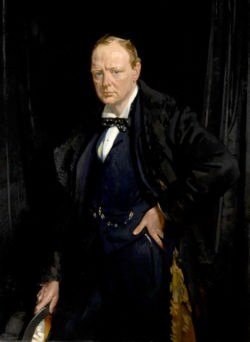An opinion piece by Dr Lukas Meier
It is a captivating portrait that shows a determined leader. When I joined the College last year and noticed the painting in our dining hall for the first time, I paused for a moment to investigate my feelings towards this man after whom the College is named. There was discomfort with his imperialist mindset; there was also admiration: for a prime minister who managed to defend his country against the Germans. I am German. And so there was also shame – and gratitude that I have always felt welcome in the UK, despite what had happened. The dark days, I said to myself with relief, are long gone. What are eighty years? A lifetime. An eternity. I have never had to experience war; my parents didn’t. And what my grandparents sometimes spoke about seemed unimaginably far away.
What becomes familiar slowly begins to escape awareness. We tend to take for granted what we have grown accustomed to. Churchill’s portrait was always there. Had it been removed, I would certainly have noticed. But as it remained present, I didn’t pay any further attention to the piercing eyes overlooking High Table.
The other day I was sitting in Hall again. Outside, it was already getting dark. I was eating alone, lost in thought: Russia had just invaded Ukraine, and I was trying to get to grips with the horrors unfolding. Suddenly I noticed a steady gaze directed at me. I turned my head just about an inch – it was Churchill. To my surprise, he appeared to look rather different. But certainly it was just the light. Gone was the comfortable temporal distance that I had felt when thinking about war. Gone was also the reassuring abstractness of darker times. Was he saying anything? Don’t take for granted what you have grown accustomed to.

Dr Lukas J. Meier is a Junior Research Fellow at the University of Cambridge who specialises in bioethics and the philosophy of mind
